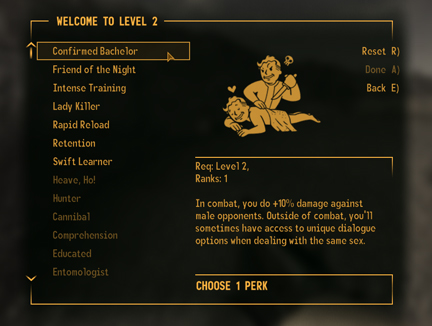
Image Credit:
Fallout: New Vegas
Since early 2006 – when Blizzard Entertainment met with criticism and controversy for threatening to oust a player advertising a lesbian, gay, bisexual and transgender (LGBT)-friendly World of Warcraft guild – queer visibility in the world of gaming has exploded. Grand Theft Auto IV: The Ballad of Gay Tony gave the world of gaming its first eponymous queer character, “Gay” Tony Prince, just last year; and, as though mirroring America’s slow shift in public opinion from “separate-but-equal” solutions to full-fledged marriage equality, mere same-sex cohabitation in the Sims 2 graduated nine years later to gay marriages in the Sims 3 (2009). Dragon Age: Origins, from that same year, includes a memorable elf-on-elf scene which, in the words of the conservative World Net Daily, “depicts two men in various sex positions in a secret scene of homosexual seduction.” And finally, ongoing controversy over the possibility of same-sex coupling in Mass Effect 2 has prompted Bioware to lock down any forum discussion on the subject – perhaps in a misguided attempt, similar to Blizzard’s five years ago, to protect sexual minorities from abuse by mandating their invisibility.
The newfound visibility of queers in games serves as a kind of compelling synecdoche for our increasing, if troubled, presence in popular culture. It offers, too, a unique case study in sexual identity, complementing ongoing debates in queer activism, theory and culture as to how LGBT identity is created to begin with, and offering a compelling resource to teaching and scholarship on theories of sexual identity – in courses such as my own Gay and Lesbian Literature and Culture, or other courses grappling with the rhetorics of gender, sexuality, and identity formation.
In her foundational Epistemology of the Closet (1990), Eve Kosofsky Sedgwick traced a governing tension between minoritizing and universalizing approaches to sexual identity, the former seeing homosexuality as the purview of a minority of actual homosexuals and the latter as a possibility for all persons, across a wide range of sexualities. This tension – along with the complementary binary of essentialist (one is intrinsically gay or lesbian) versus constructionist (all sexualities are socially constructed, shaped and formed by context) models – governs our notions of sexual identity. The making of sexual identity in contemporary video games demonstrates these ongoing debates, making thorny if foundational concepts in queer studies far more apparent and intuitive to the student.
The Sims (2000), for example, takes a generously universalizing approach. In lieu of making a particular sexual identity part of the character-formation process, developers chose to populate the game entirely with equal-opportunity Kinsey-3’s, each character intrinsically bisexual. Left to his or her own devices, a Sim is equally able to form romantic attachment with either sex, and one’s sexual identity is predicated more on interpersonal connection than on any intrinsic or personal difference.
Contrariwise, the recent Fallout: New Vegas has taken a minoritizing perspective, even building sexual minority status into the process of character formation. Character “perks,” such as the aptly-named Confirmed Bachelor trait, define one’s character as gay (Cherchez la Femme, incidentally, is the lesbian version) as they offers bonuses in conversations with sexual minority non-player characters.
1. Confirmed Batchelor used in dialogue; a gay NPC's response
Finally, other video games are destabilizing sex, gender and sexuality outright. In MolleIndustria’s Queer Power, styled after fighting games such as Mortal Kombat and Soul Calibur, two players race to beat each other to sexual orgasm while seamlessly transforming in gender, sexual position and erotic activity. Queer Power is, in the words of creator Paolo Pedercini, “loosely inspired by queer theory and particularly the work of gender theorist Judith Butler,” and as in Butler’s groundbreaking work – which thinks through how the performance of gender in fact constructs the categories of sexuality, gender, and even biological sex – how you act defines what you are, not vice-versa. The concept, as well as the theorist’s notoriously convoluted writerly style, is likewise reflected in a recent release from the UCLA conceptual-design outfit Queer Technologies: TransCoder, a “Queer Programming Anti-Language” which offers “libraries rooted in theories of queerness as an attempt to sever ontological and epistemological ties to dominant technologies and interrupt the flow of circulation between heternormative culture, coding, and visual interface.”
2. MolleIndustria's Queer Power; Queer Technology's Transcoder

